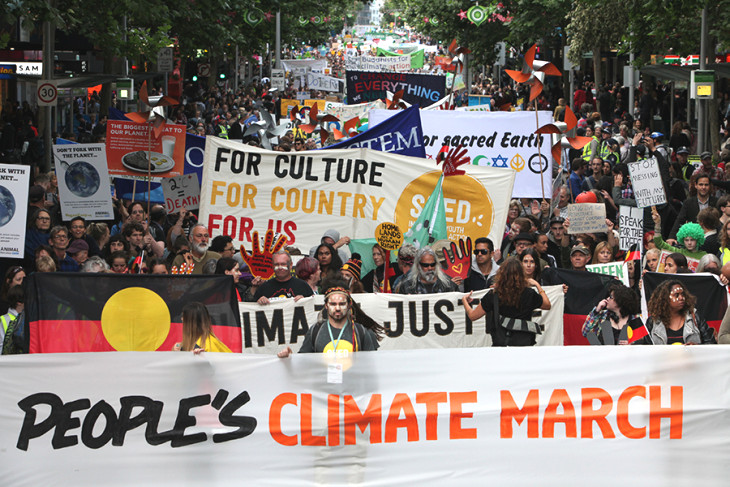
The global climate march in Melbourne, Australia, kicked off the marching season with tens of thousands of participants.
That was a big boost for people in Paris: those who could not march themselves because marches had been prevented for security reasons, and those flocking into the French capital to participate as delegates, observers, journalists, lobbyists, civil society representatives.
It was truly the biggest turnout of citizens ever for climate protection and solidarity. Hundreds of thousands of people defied all obstacles to the marches. Some 2300 events in 175 countries were registered around the world and counting. Possibly even more smaller events never made it into the official record, but contributed to the global chorus.
Mundus maris was at the event in Duesseldorf
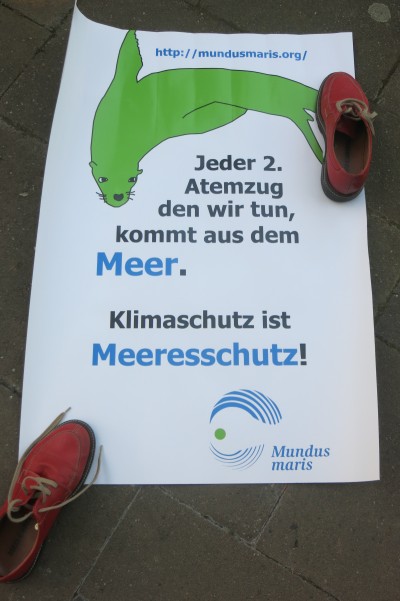 Organised by an initiative of people already at the centre of last year's climate march on 21 September, this year's support group and sponsorship grew encouragingly.
Organised by an initiative of people already at the centre of last year's climate march on 21 September, this year's support group and sponsorship grew encouragingly.
With Maik Willmes, Nick Goedeking, Mattes Liebsch and Prof. Dr. Gößling, the core team kept inspiring others to participate and engage.
Among others, sponsors comprised a company promoting renewables and electricity savings and the local savings bank (Stadtsparkasse).
Günter Karen-Jungen, green Mayor of Düsseldorf, offered his patronage.
The event in the Bohème Quarter of the state capital combined moderation, short informative talks with lots of live music by Mrs. Brightside and her band and ample opportunities for chats among participants.
11:00 h - Welcome by the mayor of the state capital Düsseldorf
11:15 h – Live - Music
11:30 h – Prof. Claus Gößling: What is climate change about? Background remarks
11:45 h – Live - Music
11:50 h - Mattes Liebsch: Presentation of the 10-Point-Plan - what can I do myself
12:05 Uhr – Live - Musik
12:15 Uhr – Nick Goedeking: Climate Change – Background info about the UN Summit in Paris
12:30 h – Live - Music
12:35 h - Jörg Heynkes: The role of small and medium sized companies in counteracting climate change
12:42 h – Carmela Melstroem – what can very small companies do?
12:50 h – Live - Music
13:00 Uhr – Prof. Claus Gößling & Mattes Liebsch: 10-Point-Plan - some more advice
13:15 h – Live - Music
13:20 h – Discussion with Experts
13:55 h – Closing Remarks
 Mayor Karen-Jungen welcomed participants and expressed the commitment of the city council to strengthen climate mitigation measures of all public administrations as well as subsidising energy-saving measures of citizens and companies.
Mayor Karen-Jungen welcomed participants and expressed the commitment of the city council to strengthen climate mitigation measures of all public administrations as well as subsidising energy-saving measures of citizens and companies.
A lighthouse project was the new hyper-efficient electricity plant that provided central heating as well and was billed as currently the most advanced in the world.
But the city was also investing in climate proofing its car fleet, increasing energy efficiency of public buildings and promoted practical action by citizens as well.
The watchword was - nobody can do it alone, but everybody can do something.
Prof. Dr. C. Gößling followed up on this theme and explained the physical principles behind the greenhouse effect and its initally beneficial effects on our planet's climate.
Echoing the results of the last assessment report of the Intergovernmental Panel on Climate Change (IPCC) he noted that the each of the last three decades had increased average temperatures compared to the previous one.
The CO2 emission of an "average" German was a whopping 11 tons/year (some estimates are even as high as 12.5 tons). That includes emissions not provoked by the individual directly, but arising from different services and institutions, such as health care, the military, the industrial food system etc.
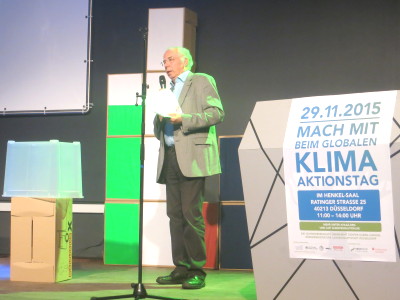 The thinning of ice shields and melting of glaciers around the world. The warming ocean has increased sea levels in the last century by 19 cm, more than in the previous 2000 years.
The thinning of ice shields and melting of glaciers around the world. The warming ocean has increased sea levels in the last century by 19 cm, more than in the previous 2000 years.
We can measure current change compared to past states. It is difficult to predict the future. Therefore, scientists develop scenarios based on different types of behaviour of people, companies and entire societies.
Strong immediate efforts to stop further CO2 emissions offer hope to keep warming at the end of this century to about 2°C as proposed to the UN Climate Summit in Paris starting tomorrow. It is worth noting that African and island countries are militating for limiting the warming to 1.5°C as their existence is otherwise in jeopardy.
However, if business continues "as usual" - as still seems to be the case despite much talk - we are heading towards a world that will be 3 to 5°C warmer on average at the end of this century.
Nobody can predict with certainty how Earth will look like. The climate models available at the moment can not describe such a regime very well.
We do know, however, that only the one degree increase experienced so far has already led to more extreme weather events, lots of damage to people and infrastructure and that tropical animals such as corals already die en masse because their temperature tolerance is exhausted.
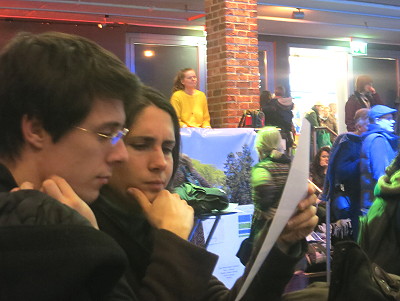 Focusing on what can and must be done to prevent warming from running totally out of control, the organisers presented a 10-point-plan for immediate action.
Focusing on what can and must be done to prevent warming from running totally out of control, the organisers presented a 10-point-plan for immediate action.
The plan addresses the four big areas of average annual CO2 emissions by German citizens:
- mobility (2.4 tons)
- consumption and food (4.5 tons)
- electricity (0.8 tons)
- heating (1.8 tons).
Advice covers suggestions such as taking more bicycle rides instead of the car, avoid air travel if possible, reduce meat consumption, chose a utility providing electricity from renewable sources, abolish the stand-by mode of household appliances, and insulate your house or appartment.
Click here to download the 10-point-plan for immediate climate action (in German).
There was plenty of opportunity to get more information about how to put these and other measures into action. We heard from Jörg Heynkes of the Chamber of Commerce that losing or gaining money makes entrepreneurs sit up and listen to what consumers want in terms of climate friendly products and services.
A children's corner offered painting and tinkering and Mrs. Brigthside and her live band lifted the spirit with a wide spectrum of music.
Catch the atmosphere by clicking on the link to the video. Click here for more info on climate solutions. All pics on this page by Cornelia E Nauen.
Virtual march in Brussels
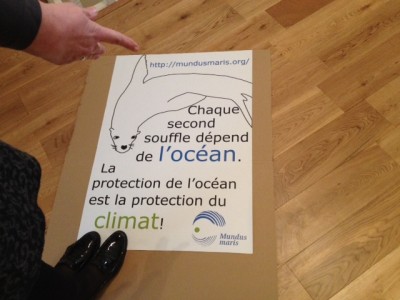 In Brussels security concerns led to several false starts - gathering on 29 November at noon on the central Grand Place - yes, no, yes ....
In Brussels security concerns led to several false starts - gathering on 29 November at noon on the central Grand Place - yes, no, yes ....
To play it safe, there were several smaller activities all geared to exchange about what was at stake for our future at the Paris Summit and showing solidarity not only with the victims of the Paris and Beirut attacks, but with refugees fleeing violence and destruction of their environment and with all those in need.
In one of the events, participants recalled specifically the role of the ocean for climate stabilisation and life on Earth.
Felicitas, Marcos, Marianne, Regine, Peter, Manuela, Rafa, Nadia, Dorothea.... participated in a virtual march for the climate and sent this picture.
This wonderful multigenerational initiative made a pledge to take practical steps to protect the climate through something within their means they could do in their own daily lives. An example to follow! Let it become thousands, millions doing likewise.
Youths from Senegal send their messages
Thanks to some particularly committed teachers, several school classes from Senegal worked on ideas for the UN Climate Change Conference in Paris and what would be important for a safe future for themselves and their families.
Magath Diop, Director of the Khadim School in Hann entrusted the task to a young colleague who sent some photos and the strong message from 12 year-old Fatou FALL, speaking on behalf of all kids:
Pupils of the world, let's get up against global warming. Really, this planet is heating up and that's threatening.
During the night of 30 August 2015 the dwellers living near the beach of Hann Bay in Senegal have not slept until the early hours. Indeed, the Sea, our sick neighbour, has destroyed houses, pirogues, has carried away dresses, medecins and household utensils. The following day the authorities spoke about the consequences of climate change and warming.
Dear Parents, stop the emission of greenhouse gases. We are afraid of drought, of diseases, of suffering from hunger and flooding.
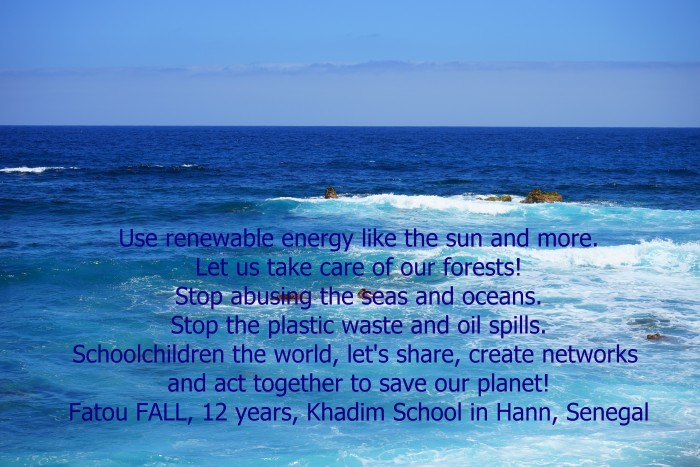
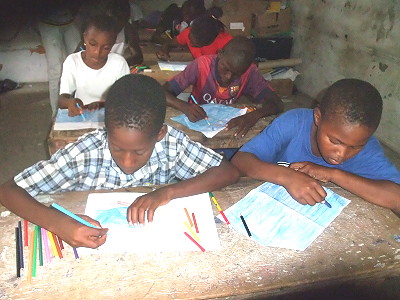 |
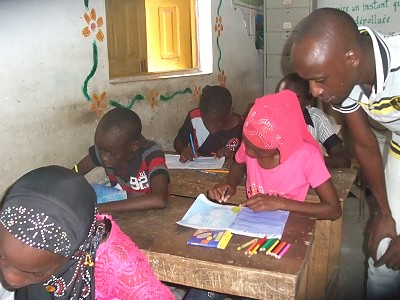 |
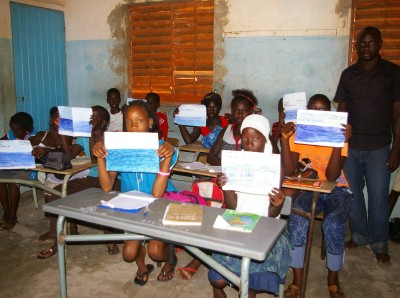 Mamadou Camara is a Teacher at the Tafsir Demba Sall 2 elementary school in Mbour.
Mamadou Camara is a Teacher at the Tafsir Demba Sall 2 elementary school in Mbour.
He is strongly committed to improve conditions for the future of his pupils and the entire community.
He sent another series of pictures with wishes and advice for the Summit.
Let these voices be heard and acted upon so that these kids have a safe future in their own country, thanks also to international cooperation and exchange.
Click here for the video with "A Sea of Ideas for the UN Climate Change Conference".
 |
 |
 |
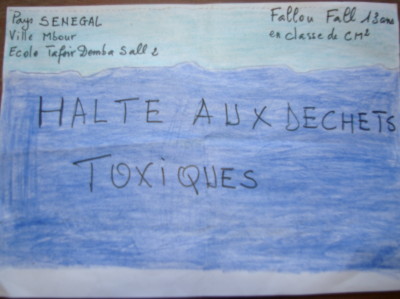 |
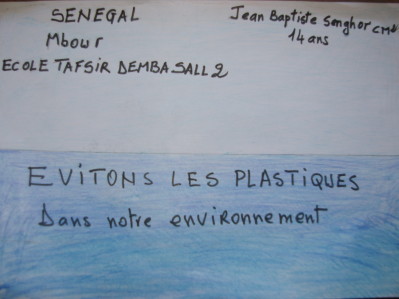 |
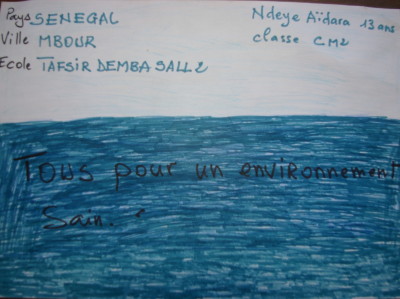 |
 |
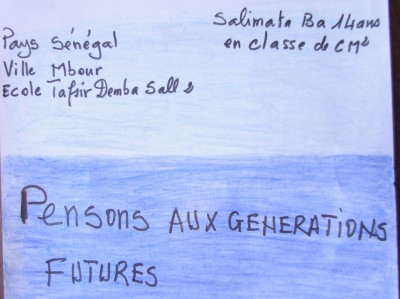 |
And the rest is history....
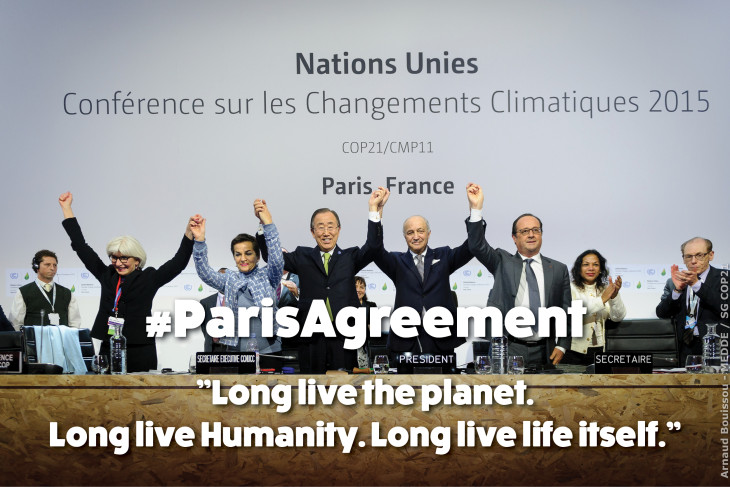
Official representatives of 195 countries agreed during the last hours of the UN Climate Summit to a common target for keeping global warming below 2°C at the end of this century. The pledges they made do not yet match the target, but the governments also agreed to review performance every five years and thus open the door for later improvements.
A demand for a rapid phase out of fossils was politically impossible given the opposition of countries with economies depending overwhelmingly on oil and gas, such as Saudi Arabia.
It's a victory of the countless people who have worked on understanding climate change, raising public awareness, triggering citizen movements and early action.
From now on, the emphasis is on implementing all existing pledges and filling the gaps to reach zero emissions as fast as possible. Civil society organisations around the globe are well advised to focus on monitoring delivery and helping to broaden and deepen commitments further. Not only can everybody do their bit, however small, but big emitters like the air industry and maritime shipping also need to come into the fold, given that together they account already for about 6% of global emissions and rising.
We are happy to have contributed to this encouraging result of the Summit, but we also know a lot of hard work lies ahead to enable the major economic and technical transformations required in a socially acceptable manner.














